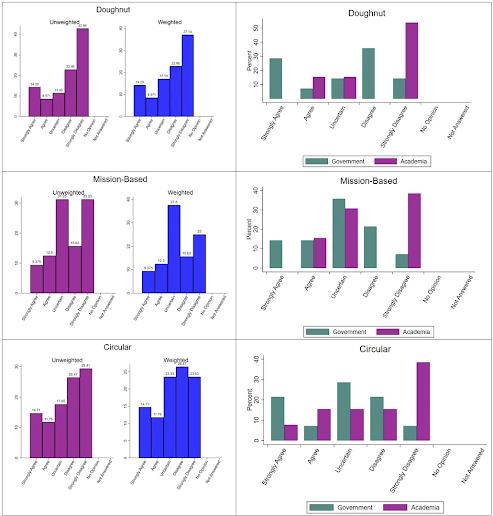My column for this week in Newsroom, jointly authored with Otago Uni's Dennis Wesselbaum, goes through the findings from the latest survey of New Zealand's economists.
The survey asked NZAE members whether they were familiar with circular, doughnut, and mission-based economics. It asked whether inclusion of those concepts has improved policy analysis, and whether increased focus on those approaches would improve policy analysis. It finally asked whether those concepts should be included in the core curriculum of economics.
Respondents from academia found these concepts to be of very limited value. Respondents from within government either found the concepts to be helpful, or were uncertain about them.
For example, here is the pattern of responses to question 3, which reads:
"Economic policy would be improved by placing greater weight on [each of Doughnut Economics, Mission-based economics & the Circular Economy], even if it meant less analyst time and capability was available for other types of analysis."
The modal academic strongly disagreed that any of these improved analysis. The same was not true for government-employed economists.
I have, for some time, worried about the apparent disconnect between New Zealand's academic economists and people employed as economists by the Ministries in Wellington.
Government-employed economists seem to have picked up an awful lot of trendy-sounding things that resonate with Ministers. They rarely talk with academics. And many have no clue or do not care how far they have strayed from the academic consensus.
It is a problem.
A lot of angry people in the Newsroom comments section told me how evil I am to be neoliberal and such. But the more useful comments I heard back were via email.
In one case, the correspondent had had no clue that circular economics was anything other than mainstream. Because it's all they'd heard in policy discussions.
In another case, a Mayor provided this dispatch from a meeting over the past year, edited slightly to anonymise the response.
It reminded me of a meeting I was at XXXX weeks ago, the aim of which was to discuss regional policy making to deal with the effects of climate change. A number of the sessions were reasonably sensible until we came to a session on "Food Security". The presenter talked for an hour on all the things we should be doing in the future to make sure we and our communities would not starve. We had ideas such as cutting large farms into smaller farms so that more people would be able to grow their own food. We had the (food) productivity growth that would follow more people putting their scraps into their worm farms and so on and so.I waited for a discussion of food chains, markets, supermarkets, growing food at scale so that large numbers of people get to choose what they eat, the wonders of our internal transport mechanisms - and I waited and waited. And waited. It never happened. These presenters were meant to be planners and I despair. By comparison a donut economy sounds like something I might actually eat and enjoy.
There is an awful lot of woo infecting policy. Normally it's the economists who insist on rigor to stop this. That failsafe is not nearly as safe, in Wellington, as it ought to be.
And unfortunately the Government Economics Network, whose purpose should be to upskill government-employed economists, mainly seems to highlight heterodox approaches that have less support among mainstream economists but are convenient for rationalising policies that Ministers prefer.
When I taught Econ 224 at Canterbury, Econ & Current Policy Issues, I included a few things as defence against the dark arts - stuff I thought the kids needed to know so they could bat back woo when they encountered it.
I wouldn't put any of these three surveyed items in the core. But it would be great if some of our principles classes could remind students that we have an entire field of environmental economics. It isn't that economists don't care about the environment, as fans of circular stuff seem to believe. It's that we want solutions that work. Environmental economics is rigorous. Other options are not.


The woo isn’t just infecting economics, sadly. The biological sciences have been hit hard by the inclusion of Mataraunga Maori and te tiriti based concepts. I’m now overseas, but advocates of MM have found themselves in positions of leadership in several university departments and research centres in NZ. I’ve been told it’s almost impossible to advance in your career if you don’t pay lip service to these ideas within your research and teaching. We are risking isolating NZ scientists from the international scientific community as overseas trained scientists are less hirable. I wonder if economics is the same- ie would treasury hire an overseas trained economist with no understand of the Treaty over a slightly less qualified local candidate who did?
ReplyDelete